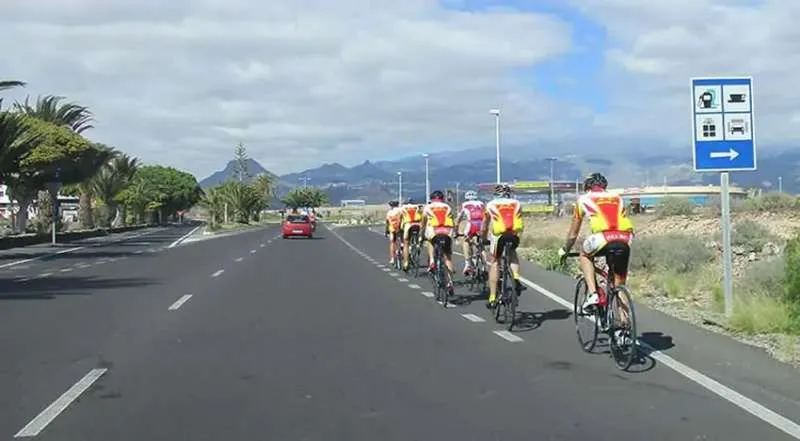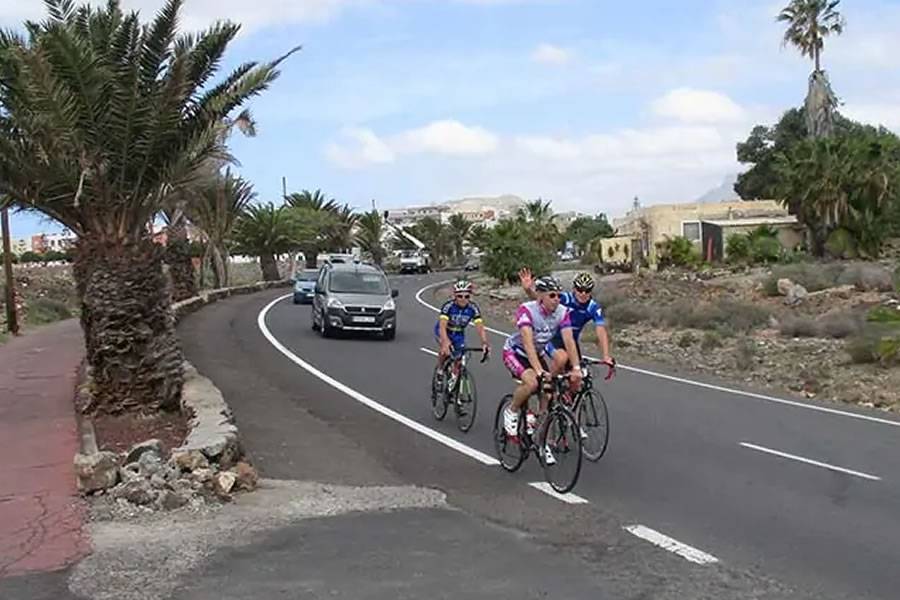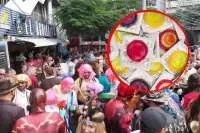Fines for groups of cyclists: The DGT imposes rules for riding in a ‘peloton’
- 14-04-2023
- National
- DGT - Trafico
Cyclists are one of the most vulnerable, yet controversial, users of public roads, so they should take extreme precautions and respect traffic regulations. However, many of them are unaware of, or fail to comply with, some of the rules set by the General Traffic Regulations and the corresponding Municipal Traffic Ordinance, and one of these is a fine for driving in a group or ‘peloton’.
The DGT (Department of Traffic) rules explain that not following this regulation can pose a risk to the safety of cyclists and to other road users, with fines up to 1,000 euros.
In fact, it’s not just for riding in groups that cyclists can be penalised or sanctioned, here are some of the most common offences committed by cyclists and the fines they entail, according to the DGT website and social media.
Helmets:
The use of a helmet is mandatory for cyclists on interurban roads, that is, outside towns. On urban roads, only those under 16 years of age are required to wear it. The helmet must be approved and fitted correctly. Fine for not wearing a helmet when it is mandatory: 200 euros.
Mobile phone and headphones:
Cyclists may not use mobile phones or wear headphones/earpieces connected to phones or music players while riding, as they limit their hearing and may cause distractions.
Fine for using a mobile phone or headphones: 200 euros.
Cycling under the influence of alcohol:
Cyclists are also subject to the maximum BAC allowed for drivers in general, which is 0.5 g/l of alcohol in blood or 0.25 mg/l of alcohol in exhaled air. In addition, they are required to submit to breathalyzer tests if required by an agent.
Fine for a positive breathalyzer test: 500 – 1,000 euros (depending on the rate and recidivism).
Cycling with a passenger:
Cyclists can only carry one passenger if they are under 7 years old and are in an additional approved seat. In addition, the cyclist must be of legal age.
Fine for carrying a child passenger incorrectly: 100 euros.
Lights:
Cyclists must have front and rear lights when riding at night, in underpasses, or through tunnels, to see and be seen. The lights must be white or yellow at the front and red at the rear. They must also have a red non-triangular rear reflector and reflective elements on the pedals or wheels.
Fine for not using lights: 200 euros.
Right of way:
Cyclists must respect the right of way for both vehicles and pedestrians. In particular, they must give way at properly marked pedestrian crossings, and when they turn onto another road and there are pedestrians crossing it, even if there is no crossing.
Fine for not respecting the right of way: 200 euros.
Cycling on pavements:
Cyclists cannot ride on the pavements or pedestrianised areas unless there is specific signage that allows it. Nor can they cycle through landscaped areas or public parks. Only young children can ride on the pavement, as long as they are supervised by an adult.
Fine for cycling on pavements or in pedestrian areas: 60 euros.
Cycling lanes:
Cyclists must use the cycle lanes whenever they are available, both in the city and on main roads. Failure to do so may entail a minor or serious offence depending on the case.
Fine for not using cycling lanes: 60 – 200 euros.
Pedestrian crossings:
It is forbidden for cyclists to ride across pedestrian crossings. The rule states that cyclists must dismount and walk with their bike across crossings on foot.
Fine cycling across a pedestrian crossing: 200 euros.
Overtaking:
Cyclists must overtake vehicles moving slower than them on the left, leaving a lateral safety distance of at least 1.5 metres. If the vehicle they overtake is a bicycle, they can do it on the right or on the left, but always with enough distance.
Fine for overtaking incorrectly: 200 euros.

Cycling in groups:
Without a doubt, among the traffic regulations for cyclists, this is the one that has caused the most controversy for athletes. It establishes that several cyclists can circulate, but they must do so in a maximum column of two (in pairs), as close as possible to the right edge of the road and moving into single file on sections of road with bad visibility, when there is a lot of traffic, or when indicated by a sign.
Cyclists can ride in parallel as long as they do not hinder the flow of traffic, and they must ride in single file if ordered to do so by the police.
Fine for not respecting how to cycle in a group: 60 euros.
Signalling:
Cyclists must use their arms to signal their manoeuvres, such as turning or stopping. They can also indicate sudden braking by alternately moving their arm up and down with short and quick movements. Cyclists must extend their arms horizontally and sufficiently in advance to signal manoeuvres.
Fine for not signalling correctly: 60 euros.
Bell:
All cyclists must have a functionning bell on their bicycle to warn other road users of their presence. Other types of acoustic signals, such as whistles or shouts, cannot be used.
Fine for not having a bell: 60 euros.
Speeding:
Cyclists must respect speed limits in the same way as any other vehicle on the road. They must also take into account that they are not allowed to exceed 45 km/h on urban roads and 25 km/h in 30 zones.
Fine for exceeding the speed limits: 100 – 600 euros (depending on the excess).
Parking:
Cyclists must park bicycles in designated places without hindering the passage of pedestrians or vehicles. They cannot leave their bicycle tied to trees, lampposts, benches, or traffic lights.
Cyclists can park their bicycles on pavements as long as they do not disturb pedestrians and respect a minimum distance of 3 metres from the entrances of buildings or premises.
Fine for parking a bicycle incorrectly: 60 euros.

Documentation:
Cyclists are not required to carry any type of personal or vehicle documentation unless they have committed an infraction and the police require them to identify themselves. In this case, they must provide their personal ID.
Fine for not providing ID: 60 euros.
Also, it is recommended that cyclists carry the receipt or proof of purchase of their bicycle to prove ownership in case of theft or loss.
Insurance:
Cyclists are not required to take out compulsory civil liability insurance to ride on public roads unless they participate in competitions. However, it is recommended to have voluntary insurance that covers possible damage to themselves or to third parties in case of an accident.
These are some of the rules that cyclists must follow to ride safely and avoid penalties. Cyclists, other drivers, and pedestrians must respect the rules of the road and have a civic and responsible attitude on public highways.
Other articles that may interest you...
Trending
Most Read Articles
Featured Videos
TributoFest: Michael Buble promo 14.02.2026
- 30-01-2026
TEAs 2025 Highlights
- 17-11-2025



























































